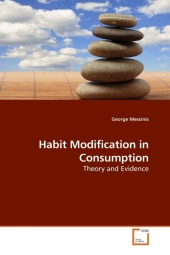 Neuerscheinungen 2010Stand: 2020-01-07 |
Schnellsuche
ISBN/Stichwort/Autor
|
Herderstraße 10
10625 Berlin
Tel.: 030 315 714 16
Fax 030 315 714 14
info@buchspektrum.de |

George Messinis
Habit Modification in Consumption
Theory and Evidence
2010. 252 S. 220 mm
Verlag/Jahr: VDM VERLAG DR. MÜLLER 2010
ISBN: 3-639-23637-8 (3639236378)
Neue ISBN: 978-3-639-23637-8 (9783639236378)
Preis und Lieferzeit: Bitte klicken
The explosion of the consumer society and household credit has given rise to two contrasting views of modern man. One perceives the consumer as highly intelligent who acts rationally purely on information pertaining to her current and future assets. The other portrays the typical consumer as irrational that lives beyond her means. In the tradition of Aristotle, Veblen, and Duesenberry this book challenges these two polar views to propose that consumer habits are rational and can evolve through consumer investments and their participation in social institutions. The study outlines two models of habit modification that highlight the role of (i) investments on consumer durables, and (ii) contractual comittments. Empirical evidence for the USA shows that household debt commitments help the average consumer to modify her habits and to adopt a more rational and forward-looking behaviour that can resemble that proposed by the conventional rational-expectations model. This work sheds light on the rationality and importance of consumer habits and institutions and would be valuable to professionals in Social Sciences and Humanities.
George Messinis is Senior Research Fellow at the Centre for Strategic Economic Studies (CSES) at Victoria University in Australia. He holds a Ph.D from The University of Melbourne. He has also conducted research on Employment Indicators, Human Capital, Innovation, and Economic Growth.


